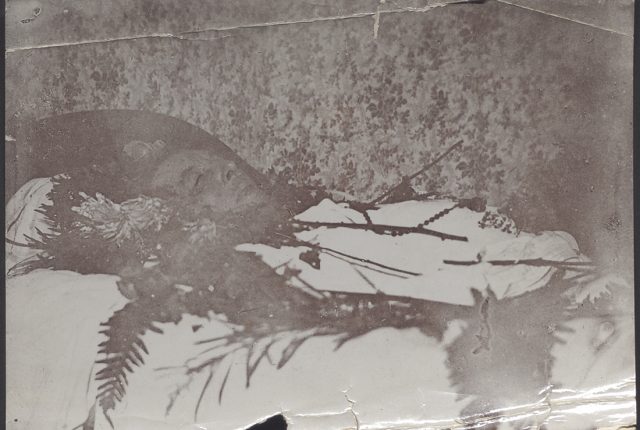
On February 21, Joseph Bristow, Distinguished Professor of English at UCLA and renowned Wilde scholar, presented a wonderfully illuminating exploratory public lecture, using documentary evidence (including letters, bills, invoices, and personal accounts) to elucidate the circumstances surrounding the final days and hours leading to Oscar Wilde’s untimely death from encephalomeningitis at the age of forty-six. Through careful examination of notes made by the Irish Passionist priest Father Cuthbert Dunne, who converted Wilde on his deathbed to Catholicism, and letters written by Wilde’s friend Reginald Turner, who had been a steady bedside presence in the weeks preceding Wilde’s death, and who was actually present at the moment of death, Professor Bristow set out to correct the more well-known but “rather embellished” and “fanciful” account created by Wilde’s literary executor Robert Ross. By bringing these various accounts and documents into conversation with each other, while also recognizing that each man had differing investments in Wilde’s legacy, Bristow sought to set the record straight and correct false accounts claiming that Wilde had died of syphilis, and identified the actual cause as meningitis, brought on as a result of injuries he had suffered while in prison, and the subsequent botched surgical interventions that led to infection and, ultimately, death. Bristow’s careful and extensive foray into the documentary records also shed much light on Wilde’s strained finances at the time of his death, including his indebtedness to the proprietor of the rather shabby Hôtel d’Alsace, where Wilde died on November 30, 1900.
Bristow’s talk also served as an excellent example of the fine scholarship and new discoveries that can be made by the thorough, thoughtful, and wide-ranging examination of documents such as those held by the Clark Library. The Clark holds arguably the world’s most extensive collection of materials relating to Wilde and Wildeiana, and it was indeed on those sources, many of which have seldom been consulted by previous scholars, that Bristow based his fascinating study. Bristow illustrated his talk with forty slides of documents, including photographs, letters, bills, and invoices, providing detailed references, commentary, and interpretation; putting each slide in context, he drew attention to details that warranted close attention, and in the process brought the audience along on an illuminating journey of discovery into the details of the last weeks and hours of Wilde’s life. Bristow also noted that finding aids for the Clark’s collections of Wilde and Wildeiana can be found online at the Online Archive of California (https://oac.cdlib.org/). Given the accessibility of such finding aids (created by the expert librarians and archivists at the Clark), and the existence of such a fine collection of primary source materials, we can certainly look forward to more discoveries, and future stimulating and exploratory talks and studies by Professor Bristow and other scholars using the extraordinary resources of the Clark Library! Check out the lecture on our YouTube Channel.
-Hillary Gordon, Manager, Royce Reading Room

